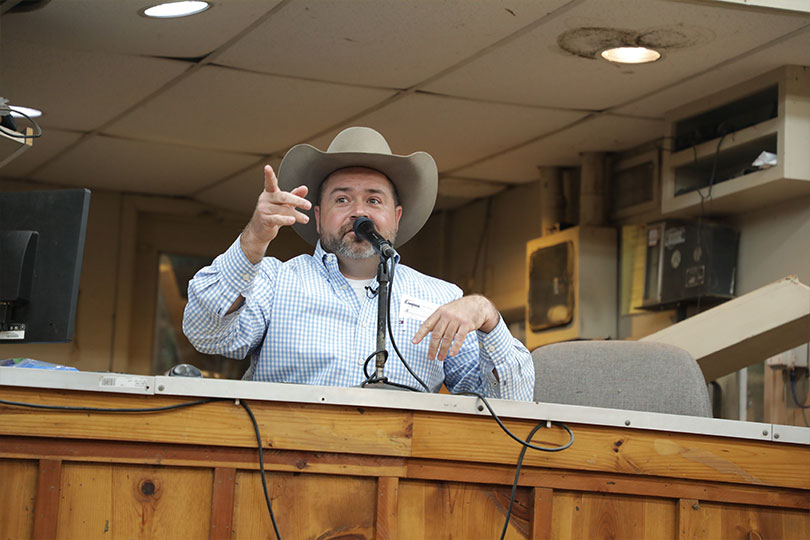By Shelby Shank
Field Editor
“Who bid one dollar? Who bid two?” is how Andy Baumeister, owner of Lampasas Cattle Auction, begins his auctioneer’s chant.
Baumeister has been infatuated with the art of auctioneering since he was a young boy growing up in a small town in Illinois.
At three years old, Baumeister was holding horse sales in his basement with his two sisters.
“Somebody would always get mad because they wanted a horse more,” he said. “I don’t know how many horse sales we had in my basement as kids, but I would get up and auctioneer, and my sisters would start bidding.”
He attended horse sales with his grandpa, and they would pretend to hold their own horse sales in the barn when the weather was bad. They each took turns auctioneering and leading a horse around the pen.
He recalls selling at his first horse sale when he was only 12 years old.
“I sold a saddle rack for $18, and I’ll never forget it,” Baumeister said. “My first sale that I promoted and auctioneered was my own horse sale. It could probably be considered a flop, but things have come a long way since then.”
The first-generation auctioneer always wanted to sell livestock. In 2007, he moved to Texas to pursue that dream. From writing tickets at the sale barn to weighing cattle, Baumeister learned the ins and outs of auctioneering.
But his ambition didn’t stop there. He wanted to own the sale barn, too.
In 2019, Baumeister and his wife, Jayde, fulfilled that goal. They bought the Lampasas Cattle Auction where they now host cattle auctions every Wednesday.
To prepare for an auction, Baumeister practices tongue twisters and drills he learned in auctioneer school. Similar to how a singer prepares for a performance, an auctioneer warms up their vocals before a sale.
“It’s all in just popping my tongue, and keeping that rhythm is what keeps things going,” he said. “You have to keep the interest of buyers and get their attention to continue bidding. That’s why we talk so fast.”
He also likes to keep the audience on their toes and throws in a few jokes while selling.
His talent on the mic is evident. Baumeister competed in his first qualifying competition for the World Livestock Auctioneer Championship (WLAC) in 2018.
In December 2022, Baumeister was named champion at a WLAC qualifying event in Longview. He will compete at the 2023 WLAC semifinals at Arcadia Stockyard in Florida this summer.
Contestants are judged on a variety of criteria during the live auction. Scores are given based on the auctioneer’s presentation of sale through professionalism and poise, as well as the auctioneer’s body language and eye contact with the crowd. Contestants are also judged on the clarity of their chant and how well they control their voice and rhythm. Knowledge of the product and bid catching are important components of the judging process, too. Contestants are even scored on how likely they are to be hired to auctioneer.
Formal interviews also account for 25% of contestants’ final scores.
To prepare for competitions, Baumeister puts himself in situations where he has to slow down his voice.
“It’s easy for an auctioneer to get behind a mic and start auctioneering,” he said. “But when you put an auctioneer in a different situation where we have to talk slower, we clam up and want to talk faster.”
Auctioneering is more than sitting behind a mic and talking fast. It’s also knowing the value of the product in front of you.
Baumeister has a lot running through his head while he’s on the auctioneer block, but one thing always remains the same. He wants to bring in the most money he can for the seller.
“No matter if it’s a $5 t-post or a $50,000 tractor, I try to see how much we can make it bring today,” Baumeister said. “A good auctioneer works for the seller. I love sitting up there and knowing I did a good job for the customer. I helped make someone some money.”
And he’ll keep doing it as long as he can.
“Going once, going twice, sold.”


Andy Baumeister is my oldest grandson.
So so cool! U have every right to b proud!
Go Andy!